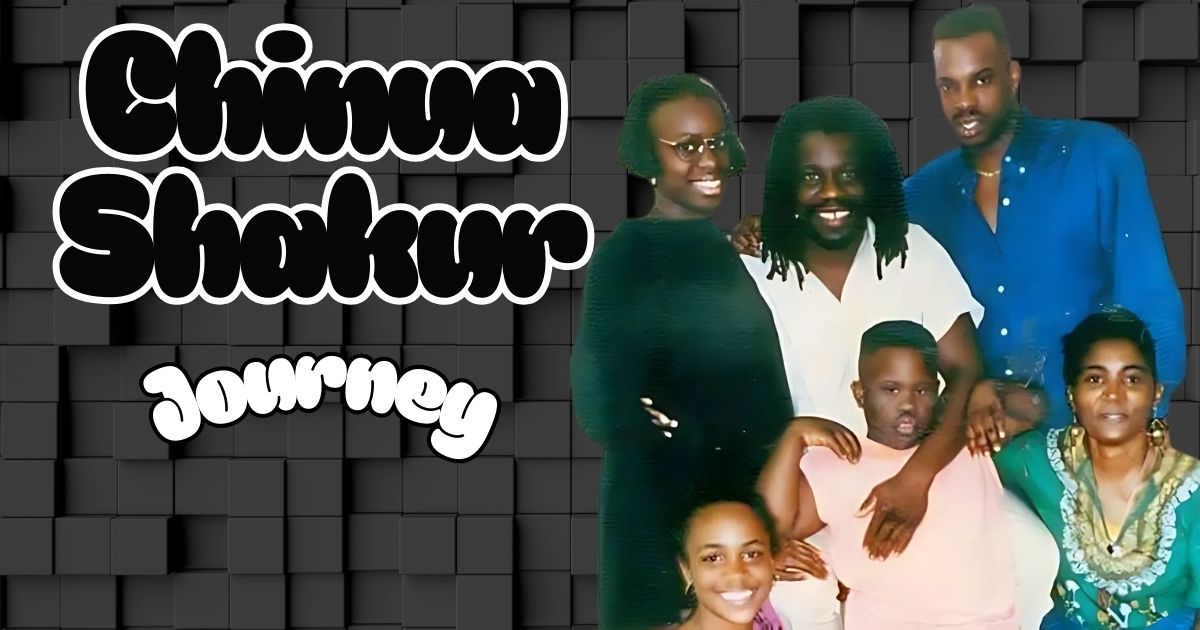What defines us more than our family legacy? In America’s complex tapestry of cultural identity, few stories illuminate the power of roots and heritage like that of Chinua Shakur. This exploration reveals how family influence shapes destiny.
Born into a notable lineage that has profoundly impacted American culture, Chinua Shakur represents more than individual achievement. His story embodies the intersection of artistic brilliance, social justice, and generational wisdom that continues influencing contemporary discussions about identity and purpose.
Through examining Chinua’s biography, we’ll uncover how the Shakur family legacy creates ripples across generations, touching everything from cultural change to personal identity formation in modern America.
Who is Chinua Shakur?
Chinua Shakur entered the world carrying an extraordinary family heritage that would shape his entire existence. Born into the renowned Shakur lineage, his early years were marked by exposure to social justice movements and cultural activism that defined his family’s mission.
The Chinua story begins with understanding his unique position within American cultural history. His upbringing wasn’t typical suburban childhood. Instead, it involved constant exposure to intellectual discourse, political activism, and artistic expression that characterized the Shakur household.
Key Early Influences:
- Exposure to civil rights discussions from childhood
- Artistic environment fostering creative expression
- Educational emphasis on cultural roots and identity
- Community involvement in social change movements
- Mentorship from established activists and artists
Growing up meant navigating the complexities of being part of a family of Shakur members who consistently challenged societal norms. This background heritage provided both opportunities and responsibilities that would define his life’s trajectory.
Personal Identity Formation
The life of Chinua demonstrates how generational influence shapes individual worldview. His identity formation occurred within a context where family impact extended far beyond typical household dynamics.
Chinua Shakur learned early that his name carried weight. The Shakur legacy meant every action reflected on a broader movement dedicated to equality and cultural evolution. This awareness profoundly influenced his personal development and life choices.
| Identity Formation Factors | Impact Level | Long-term Effects |
| Family activism exposure | High | Strong social consciousness |
| Cultural education | High | Deep heritage appreciation |
| Public scrutiny awareness | Medium | Careful public persona |
| Artistic environment | High | Creative expression skills |
| Community expectations | Medium | Service-oriented mindset |
His Chinua background includes navigating the balance between personal desires and family expectations. This tension created a unique perspective on individual responsibility within collective movements for social justice.
Public Recognition and Presence
Chinua Shakur has maintained a thoughtful approach to public engagement, understanding that his visibility connects directly to his family legacy. Unlike seeking fame for personal gain, his public presence serves broader cultural purposes.
His appearances often focus on cultural change and heritage preservation. Through various platforms, Chinua shares insights about maintaining identity while contributing to contemporary discussions about social evolution.
The Shakur family reputation precedes him in every public interaction. This reality shapes how he approaches media engagement, community involvement, and professional relationships throughout his journey.
Chinua Shakur Roots and Heritage
Understanding Chinua Shakur’s journey requires examining the deep cultural roots that anchor his identity. The Shakur family name carries profound significance within African American cultural movements, representing decades of struggle for civil rights and artistic expression.
Historical Context of Shakur Heritage:
- Connection to Black Panther Party ideologies
- Emphasis on education and cultural preservation
- Artistic expression as resistance and empowerment
- Community service as family obligation
- Pan-African consciousness and solidarity
The ancestral heritage flowing through Chinua’s lineage includes stories of resilience, creativity, and unwavering commitment to social justice. These historical roots provide foundation for understanding his current path and future aspirations.
Chinua Shakur inherited more than a famous name. He received a blueprint for engaging with society that prioritizes community uplift, cultural preservation, and continued struggle for equality movement advancement.
Generational Wisdom Transfer
The household effect within the Shakur relatives extends beyond typical family dynamics. Generational influence flows through structured mentorship, storytelling traditions, and shared commitment to social change objectives.
Makini Shakur, his mother, exemplifies how parental influence shapes perspective and values. Her activist background and dedication to family heritage preservation created an environment where cultural awareness flourished naturally.
Methods of Wisdom Transfer:
- Oral tradition sharing – Stories of struggle and triumph
- Educational emphasis – Formal and informal learning priorities
- Community exposure – Direct involvement in social justice work
- Artistic appreciation – Understanding creativity’s role in resistance
- Political awareness – Critical thinking about systemic issues
Dr. Mutulu Shakur, another significant family influence, contributed perspectives on healing, community organizing, and revolutionary thinking. His Mutulu influence on Chinua demonstrates how extended family members contribute to individual development.
The Shakur connections create a web of support, guidance, and expectations that continue influencing Chinua’s choices throughout his adult life.
Geographic Heritage Connections
Chinua Shakur’s roots and heritage span multiple geographic locations, each contributing unique elements to his cultural identity. From East Coast intellectual centers to West Coast artistic communities, his family legacy touches various American regions.
The Shakur lineage migration patterns reflect broader African American experiences of movement, opportunity-seeking, and community building. These geographic influences shaped family values, artistic sensibilities, and political perspectives that Chinua inherited.
Regional Influences on Shakur Identity:
- New York: Intellectual activism and artistic innovation
- California: Creative expression and entertainment industry awareness
- Various communities: Grassroots organizing and community service
- Educational institutions: Academic excellence and critical thinking
- Cultural centers: Heritage preservation and artistic development
Chinua Shakur Spotlight on Notability
Chinua Shakur has carved his own path while honoring his family legacy. His professional journey demonstrates how generational influence can inspire rather than overshadow individual accomplishment.
His career choices reflect values instilled through family upbringing. Rather than simply trading on the Shakur family name, Chinua has focused on meaningful work that advances cultural change and social justice objectives.
Professional Focus Areas:
- Cultural education and heritage preservation
- Community organizing and grassroots activism
- Artistic projects promoting social awareness
- Youth mentorship programs
- Academic pursuits in relevant fields
The Chinua biography includes recognition for work that extends his family’s commitment to equality and cultural evolution. His achievements stand on their own merit while contributing to the broader Shakur legacy.
Creative and Artistic Contributions
Artistic brilliance runs through the Shakur family, and Chinua continues this tradition through his own creative expression. His artistic work often explores themes of identity, heritage, and social change that reflect his upbringing.
Unlike his famous relative Tupac Shakur, whose artistic legacy dominated hip-hop culture, Chinua has pursued artistic expression in ways that align with his personal interests and talents while maintaining connection to family heritage.
Artistic Expression Elements:
- Cultural storytelling through various media
- Heritage preservation projects
- Community art initiatives
- Educational programming with artistic components
- Collaborative works with other cultural artists
His creative talent serves broader purposes than personal recognition. Through artistic influence, Chinua contributes to ongoing conversations about cultural identity, historical awareness, and social justice advancement.
Academic and Intellectual Pursuits
Education has always been emphasized within the Shakur household. Chinua Shakur has pursued academic excellence as both personal development and contribution to his family’s intellectual tradition.
His scholarly interests often focus on areas connecting to social justice, cultural studies, and African American history. This academic foundation supports his other work while advancing knowledge in fields important to his community.
Academic Contributions:
- Research in cultural preservation methodologies
- Publications on heritage and identity formation
- Speaking engagements at educational institutions
- Curriculum development for cultural education
- Mentorship of younger scholars and activists
The life of Chinua demonstrates how academic pursuit can complement activism and artistic expression, creating a well-rounded approach to cultural change and community service.
Exploring Family Influence
The family impact on Chinua Shakur extends beyond typical parent-child relationships. Growing up within the Shakur relatives network meant constant exposure to high-level discussions about social justice, artistic expression, and cultural preservation.
Makini Shakur, his mother, provided foundational parental influence that shaped his worldview. Her activist background and commitment to family heritage created an environment where cultural awareness developed naturally alongside personal growth.
Family Dynamic Elements:
- Open dialogue about social and political issues
- Artistic appreciation and creative encouragement
- Community service as family responsibility
- Educational excellence as non-negotiable expectation
- Cultural pride and heritage celebration
The household effect included regular visits from other civil rights leaders, artists, and intellectuals. This exposure provided Chinua with mentorship opportunities that extended far beyond his immediate family circle.
Legacy Family Members
Tupac Shakur’s influence on Chinua represents a complex family dynamic. The Tupac legacy casts a long shadow that Chinua has learned to navigate while maintaining his own identity and pursuing his own path.
The Tupac family connection brings both opportunities and challenges. Chinua benefits from association with Tupac’s artistic brilliance and cultural impact, but also faces expectations and comparisons that can overshadow individual achievements.
Dr. Mutulu Shakur represents another significant family influence. His activist work and intellectual contributions provided Chinua with examples of how to channel passion for social justice into concrete action and meaningful change.
| Family Member | Primary Influence | Legacy Impact |
| Tupac Shakur | Artistic expression, cultural awareness | Global recognition, artistic standards |
| Makini Shakur | Daily guidance, value formation | Strong foundation, activist mindset |
| Dr. Mutulu | Revolutionary thinking, healing focus | Alternative perspectives, holistic approaches |
| Extended network | Community connections, mentorship | Broad support system, diverse influences |
Intergenerational Values
The Shakur family has maintained consistent values across generations, creating a strong foundation for Chinua’s development. These generational influence patterns demonstrate how family legacy perpetuates through conscious effort and shared commitment.
Core Family Values:
- Social justice commitment and activism
- Educational excellence and intellectual curiosity
- Artistic expression as resistance and empowerment
- Community service and collective responsibility
- Cultural preservation and heritage pride
Chinua Shakur has internalized these values while adapting them to contemporary contexts. His approach demonstrates how family heritage can evolve while maintaining essential principles and purposes.
The family upbringing he received emphasized critical thinking, creative expression, and community engagement. These elements continue guiding his choices and shaping his contributions to ongoing cultural change efforts.
Community and Extended Networks
Beyond immediate Shakur relatives, Chinua’s development was influenced by extended networks of activists, artists, and intellectuals connected to his family legacy. These relationships provided diverse perspectives and mentorship opportunities.
The Shakur connections extend throughout various communities committed to social justice and cultural evolution. This network provides ongoing support, collaboration opportunities, and platforms for Chinua’s own contributions.
Extended Network Benefits:
- Mentorship from established leaders
- Collaboration opportunities in various projects
- Platform access for sharing ideas and initiatives
- Community support during challenges
- Resource sharing for advocacy and artistic projects
Summary
Chinua Shakur’s story illustrates how family influence shapes individual development while allowing personal growth and unique contribution. His journey demonstrates successful navigation of heritage expectations alongside personal aspirations.
The Chinua biography reveals several important themes relevant to contemporary discussions about identity, family legacy, and social justice. His experience provides insights for others seeking to honor ancestral heritage while pursuing individual paths.
Major Themes:
- Heritage preservation requires active engagement and adaptation
- Family legacy can inspire rather than constrain individual growth
- Cultural change benefits from generational wisdom and fresh perspectives
- Social justice work continues evolving across generations
- Artistic expression remains powerful tool for cultural evolution
Impact on Contemporary Discussions
Chinua Shakur contributes to ongoing conversations about cultural identity, heritage preservation, and social justice advancement. His perspective bridges generational gaps while maintaining connection to historical struggles and contemporary challenges.
His work influences younger generations seeking to understand their own roots and heritage while making meaningful contributions to cultural change efforts. The Chinua story provides practical examples of how to honor family heritage while pursuing personal fulfillment.
The Shakur family legacy continues through Chinua’s efforts to preserve cultural wisdom while adapting approaches to contemporary contexts. His contributions ensure that important values and perspectives remain relevant for future generations.
Conclusion
Chinua Shakur’s journey through heritage and family ties demonstrates the enduring power of cultural roots and generational influence. His story shows how family legacy can provide foundation for meaningful contribution while allowing individual growth and expression.
The life of Chinua illustrates successful integration of ancestral heritage with contemporary opportunities. His approach offers valuable lessons for anyone seeking to honor family values while pursuing personal aspirations and contributing to social change.
Through examining Chinua’s experience, we see how notable lineage creates both opportunities and responsibilities. His handling of these dynamics provides a model for others navigating similar circumstances while working toward cultural evolution and social justice advancement.
Frequently Asked Questions
How many sisters does Tupac have?
Tupac had one half-sister, Sekyiwa Shakur, from his family.
Who is Chinua Shakur?
Chinua Shakur is a member of the notable Shakur family.
What happened to Dr. Mutulu Shakur?
Dr. Mutulu Shakur was imprisoned for decades, released recently.
Did Tupac have a twin brother?
No, Tupac Shakur did not have any twin brother sibling.
Final Thoughts on Identity and Family
The Chinua Shakur story reminds us that family influence extends far beyond immediate relationships. Our heritage connects us to broader movements, historical struggles, and ongoing efforts to create positive cultural change in our communities and society.
His journey encourages others to explore their own roots and heritage, understanding how family legacy can inform and inspire rather than limit personal development. The Shakur family example shows how generational wisdom can guide contemporary action while allowing individual creativity and contribution.
Chinua Shakur’s ongoing work ensures that important values of social justice, artistic expression, and cultural preservation continue influencing future generations. His story demonstrates that family ties can strengthen rather than constrain our efforts to make meaningful differences in the world around us.










